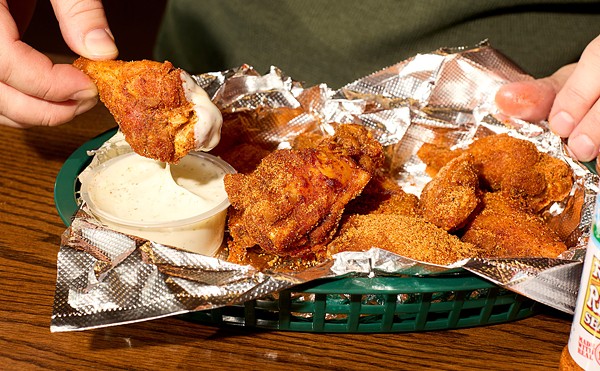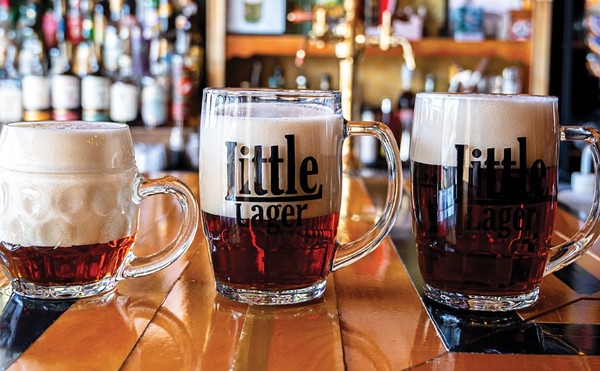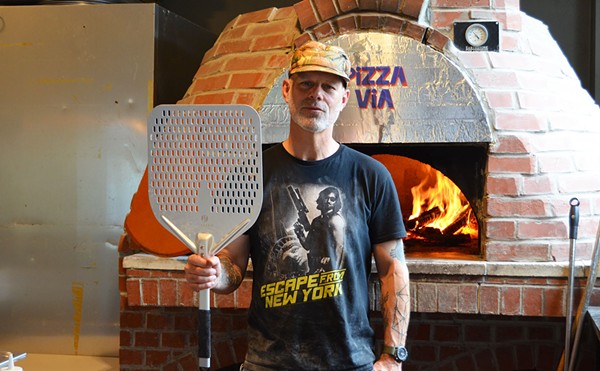Gut Check recently caught up with novelist Jonathan Safran Foer, who decided to investigate the factory farming industry in America. He recently published his findings in "Eating Animals," his first work of nonfiction. While the book isn't exactly an anti-meat screed, it presents factory farming in pretty clear and unappetizing relief.
He examines how animals are treated by modern industrial farming methods, from being bred to unnatural proportions and stuffed full of antibiotics to ultimately being painfully ripped apart by poorly paid humans. He reveals how modern, efficient methods for pig-shit disposal increase rates of asthma and other respiratory ailments. And he gives a compelling look at how utterly wasteful modern fishing methods are.
Foer is speaking Thursday evening at 7 p.m. on Washington University's campus, at the Steinberg Auditorium. We chatted with him ahead of time.
GC: Did you go into your research with any preconceived notions about what you'd find?
JSF:
I had some assumptions. I mean the assumption was basically that I was
going to write a pretty straightforward case for vegetarianism. Like
most people, I knew enough about the meat industry to know that it was
bad: bad for the environment, bad for the animals, bad for farmers and
bad for human health. I didn't really know how bad. I didn't know how
pervasive factory farming was.
But I didn't know how good the
alternatives can be, which is to say small and family farms. They
surprised me as much as anything bad I learned about factory farming. I
still came to this personal conclusion [not to eat meat any more] but at
the same time, considering they're less than one percent of the
marketplace in America, I gave [small family farms] a really
disproportionate amount of space in the book.
The strongest
positive reaction to the book has been from farmers. The strongest
negative reaction has been from animal rights groups who thought I
didn't go far enough.
I've heard that critique. Why not go
all-out and make the case for veganism [a diet that eschews all meat as
well as all animal products like eggs and dairy]?
I was
trying to write a book that would expand a conversation, and not
contract it. An argument for veganism would have contracted the
conversation.
What's right is right. One doesn't want to pervert
one's sense of right and wrong in the interest of anything. We just
can't give antibiotics to animals in the way that we do. We can't fish
in such a way that the ocean will be empty in our lifetimes of wild
fish. We can't have a farm system that's the No. 1 cause of global
warming. We can't treat animals in the ways that we're treating them.
Those are the starting points -- where one goes from the starting point depends on very personal instincts and ideas.
If
you take one of the really great farms I went to, where animals are
treated better than my dog, it becomes hard to argue against that and
the argument against that requires coming up with some very personal
answers that aren't open to argument. I have my own answers but I
wouldn't impose them on others.
At least some things do need to
be everyone's conclusion. There's a difference between coming to a
conclusion and the action that follows those conclusions. There's a
whole spectrum of options available. Up until recently this whole
conversation has boiled down to you're a vegetarian or not. Which I
think is a really mistake -- it's like saying you're an environmentalist
or not which doesn't make any sense. What would it even mean? That you
don't fly in planes, you never ride in cars? Where does one draw the
line to get that identity?
So you're encouraging people to find their own place and identity based on the facts that you present in the book.
It's
more like an appreciation that people can reach different sufficiently
respectable conclusions. Different people change at different paces.
It's very different to ask something of someone who is upper middle
class and lives near a farmers' market than it is to ask someone in an
urban food desert where there's nothing but fast food.
You
leveled some critiques at Michael Pollan, author of "The Omnivore's
Dilemma" and a leader in this emerging conversation about where our food
comes from. What's it like to take him on?
I haven't! I
agree far, far more than I disagree. I think he's the most important
food writer in the world, but I disagree with some of the things he
says. The disagreements can be important precisely because he's so
thoughtful. He's a little bit of a sacred cow...
How does journalism compare to writing novels?
Difficult,
horrible sort of. It's very constraining thing to write a work of
nonfiction -- you're bound to a particular kind of story or argument and
also bound to the world. It's much nicer to go wherever you want to go
and say whatever you want to say and pursue your imagination in whatever
direction it takes you. On the other hand, it's nice to work toward
something.
You and I spoke five years ago,
just after your novel, "Extremely Loud and Incredibly Close" came out.
That book featured a vegan protagonist, and "Everything Is Illuminated"
had a vegetarian main character. You told me at the time that you
weren't necessarily vegetarian, but it was something you were
considering...
And now look at the fruits of that instinct! See, Foer doesn't lie.
How does your family feel about your decision to cut out their traditional consumption of meat?
I
think they're really proud. It's a complicated question you've asked. I
will be proud of my kid if he takes stands, even if I don't agree with
him. They know I worked really hard and spent a lot of time away from
what I wanted to be doing. That meant a lot to them.
Some traditions are much easier to get over.
Why is meat such a touchy subject?
There's
a very bizarre and pervasive silence around it, which isn't true for a
lot of the other things I care about, even among people who are quite
moral and moralizing. I don't think there's anything more touchy. It
goes to the heart of who we are and because it can be potentially very
embarrassing and shameful. It's hard to give up. No, in fact it's not
hard at all, but I think it has the feeling of being quite hard.
Did you ever want to quit, to stop looking directly at the horrors of factory farming?
No,
the more I knew the more engaged I was and wanted to, the more I knew
the more convinced I should be writing about it. It was only hard
because it was so disgusting and pervasive. I mean an argument was
presenting itself that was just perfectly comprehensive. Any angle you
look at it was persuasive and that was kind of exciting.
Can anyone be convinced that the meat industry is utterly flawed, when presented with the facts?
I
don't think there's anybody who won't change their minds but different
people have different points of access. Facts don't work for all that
many people. People can be persuaded. I find embedding facts in an
honest, humble conversation that involves some kind of storytelling
about who you are, not casting it as a lesson begin taught or a speech
being given but an open conversation, like 'What do you thing about
this, it's been bothering me for a long time?' Facts are necessary but
not sufficient.
Do you think you'll ultimately become vegan?
Yeah, I do. I guess what I would say is that it's what I have in mind, it's just taking time. But y'know, it's not simple.
Will the experience of doing this journalistic project affect how you approach writing novels?
I
don't think so. Novels are striving to do something different. They
have a different set of tools. I mean I really look forward to moving
back into my head away from the world.
What meat do you miss the most?
Sushi.
Meet Your Meat With Jonathan Safran Foer
[
{
"name": "GPT - Leaderboard - Inline - Content",
"component": "41932919",
"insertPoint": "5th",
"startingPoint": "3",
"requiredCountToDisplay": "3",
"maxInsertions": 100
}
]





